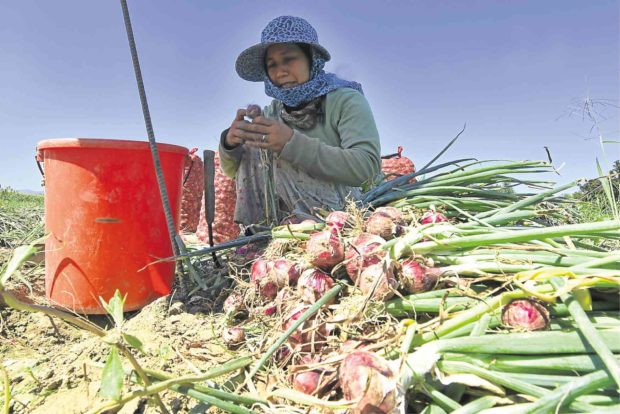
FRESH HARVEST A farmer cleans newly harvested onion bulbs at the village of Baluyot in Bautista town, Pangasinan, before these are packed and delivered to a local market. —WILLIE LOMIBAO
Onion farmers in Pangasinan and Nueva Ecija provinces are opposing the proposed suspension of the special safeguard (SSG) duty imposed on onions, saying it would mean huge losses for them and may lead to the death of the onion industry.
On August 23, Agriculture Secretary Emmanuel Piñol said he would ask the Bureau of Customs to lift the SSG to lower onion prices in the market and help ease inflation. At the time, red onions were sold for P120 a kilogram while white onions were sold at P100 a kg.
The SSG is tariff which developing countries may impose on a farm commodity once it is sold below a “trigger price,” which in the Philippines is P74.21 a kg for imported onions.
Competition
But farmers complained that lifting the SSG would flood local markets with imported onions that would be sold at P50 a kg. They said locally produced onions could not compete with that price because the prevailing farm-gate price was already P60 a kg.
Onion farmers in Pangasinan had suffered enough due to the armyworm infestation early this year, according to Edward Lagrana, an onion farmer and trader in Bayambang town.
“What would happen to us? Most of us just borrowed our capital,” Lagrana said.
In a letter sent on Aug. 25 to Samahang Industriya ng Agrikultura (Sinag), 17 members of Katipunan ng mga Samahang Magsisibuyas ng Nueva Ecija urged Sinag to discuss their concerns with Piñol.
Gov’t protection
The organization is the federation of onion farmers’ cooperatives from Bongabon, Laur and Gabaldon towns, and Palayan City, all in Nueva Ecija.
Aside from potentially huge losses, farmers said no one might venture into onion farming again because the industry would not get government protection from imported vegetables.
They said they still have 2.2 million bags (25 kg each) in warehouses in the provinces.
As of Aug. 2, warehouses in Nueva Ecija had 202,202 bags while those in Bulacan province and Metro Manila had a combined inventory of 1,316,000 bags, onion growers told the Bureau of Plant Industry. The stocks could last until November. —REPORTS FROM GABRIEL CARDINOZA AND YOLANDA SOTELO